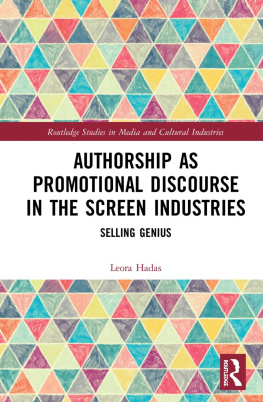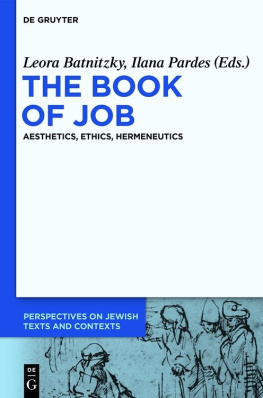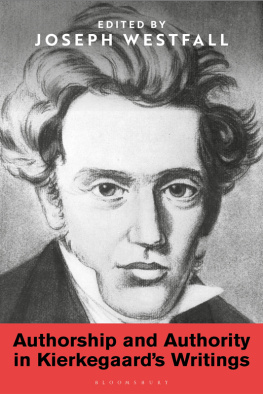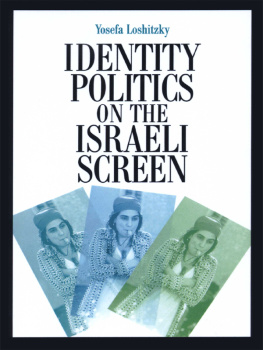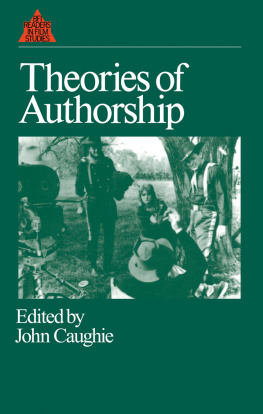Authorship as Promotional Discourse in the Screen Industries
This book discusses the use of authorship discourses and author figures in the promotion and marketing of media content, dealing with the U.S. mainstream media, including franchise film, network television, and triple-A video games.
The research takes a unique approach to studying ideas of authorship in promotion, diverging from extant approaches looking at the text, production, or reception. Conceptualizing authorship within the logic of media branding, the book studies the construction of ideas around creativity and the creative person in marketing and publicity content where media industries communicate with audiences. A cross-media approach allows the book to take a broad look and make comparisons across the increasingly integrated media industries.
The book will be of great relevance to academics in the fields of film, television, and media studies, including postgraduate students, conducting teaching and research around authorship, media industries, and media promotion.
Leora Hadas is an Assistant Professor at the Department of Cultural, Media and Visual Studies at the University of Nottingham. Her research has been published in Cinema Journal and Critical Studies in Media Communication. Research interests include media industries and production cultures, promotion and paratexts, and sustainability in media production.
Routledge Studies in Media and Cultural Industries
1 Community Filmmaking
Diversity, Practices and Places
Edited by Sarita Malik, Caroline Chapain and Roberta Comunian
2 Reconceptualising Film Policies
Edited by Nolwenn Mingant and Cecilia Tirtaine
3 Asia-Pacific Film Co-productions
Theory, Industry and Aesthetics
Edited by Dal Yong Jin and Wendy Su
4 Audiovisual Industries and Diversity
Economics and Policies in the Digital Era
Edited by Luis A. Albornoz and Maria Trinidad Garca Leiva
5 Political Economy of Media Industries
Global Transformations and Challenges
Edited by Randy Nichols and Gabriela Martinez
6 Authorship as Promotional Discourse in the Screen Industries
Selling Genius
Leora Hadas
First published 2020
by Routledge
2 Park Square, Milton Park, Abingdon, Oxon OX14 4RN
and by Routledge
52 Vanderbilt Avenue, New York, NY 10017
Routledge is an imprint of the Taylor & Francis Group, an informa business
2020 Leora Hadas
The right of Leora Hadas to be identified as author of this work has been asserted by her in accordance with sections 77 and 78 of the Copyright, Designs and Patents Act 1988.
All rights reserved. No part of this book may be reprinted or reproduced or utilised in any form or by any electronic, mechanical, or other means, now known or hereafter invented, including photocopying and recording, or in any information storage or retrieval system, without permission in writing from the publishers.
Trademark notice: Product or corporate names may be trademarks or registered trademarks, and are used only for identification and explanation without intent to infringe.
British Library Cataloguing-in-Publication Data
A catalogue record for this book is available from the British Library
Library of Congress Cataloging-in-Publication Data
A catalog record has been requested for this book
ISBN: 978-0-367-35651-4 (hbk)
ISBN: 978-0-429-34095-6 (ebk)
Typeset in Sabon
by codeMantra
To my grandfather, Yaakov Dattner
For the one gift that cannot be taken away
Much like a child, it takes a village to raise a first book. I would like to thank, first, my PhD supervisors, Roberta Pearson and Liz Evans, for unwavering support above and beyond the call of duty: I could have asked for no better mentors, in research, academia, and life in general. My thanks extend to the entire Department of Cultural, Media and Visual Studies at the University of Nottingham, particularly Paul Grainge for his wisdom and Daniel Mutibwa, Jack Newsinger, and Nuno Jorge for ever-sensible good advice. Thanks go also to Limor Shifman for setting me on the right path all those years ago; to Cathy Johnson for invaluable insights on life and purpose; and to Claire Burdfield and Ewa Syzpula, who have listened to me rant about this project far too often to be omitted from this list.
I would further like to thank my parents, sisters, and grandmother, all paragons of patience in the face of academia being rather more complicated than any of us expected. Finally, a good word to every four-legged and furry friend to have made their inadvertent contribution to research walking across my keyboard always a light in dark times.
Parts of
Parts of
Strange as it may seem, the central thesis of this book is excellently demonstrated by a man being slapped with a fish. On November 9th, 2014, comedian John Oliver aired a segment on Last Week Tonight (HBO, 2014) concerning his discovery of a salmon cannon which propels fish across dams. With a home-made version, he then commenced firing plastic fish that, through the magic of edited clips, appeared to hit other contemporary entertainers. Victims included Jon Stewart on The Daily Show (Comedy Central, 1996), Anderson Cooper on CNN News, Tom Hanks in an advertisement, Homer Simpson of The Simpsons (Fox, 1989), and J. J. Abrams on the set of Star Wars: The Force Awakens (2015). The odd man out here may not be the cartoon. Abrams alone had the dubious honour of being hit by a salmon in a behind the scenes setting. Indeed, he was the only guest appearance whose work is done exclusively behind rather than in front of the camera. His inclusion implies that the audience of Last Week Tonight were expected to recognise him on sight, and to be sufficiently interested in him as to be entertained by his slapstick plight. It is still not a common occurrence that a film director becomes as popularly well known as a two-time Academy Award winning actor; it is rarer yet for it to be a director of summer blockbusters and franchise films. Yet there Abrams was, and his presence captured in a moment a tale of continuity and change, tradition and transition.
The protagonist of this tale is authorship: one of the most central concepts in media studies, analysis, and criticism, yet one of the most challenging to pin down. Some forty years after Andrew Sarris (1962) had introduced auteur theory from Cahiers du Cinma to U.S. film studies, Gerstner and Staigers assertion that every scholar (even those who subscribe to the death of authorship) speaks of going to a Robert Altman film (2003: xi), encapsulates both the struggles and resilience of that theory. First within film studies, then expanding into television and new media, the auteur has been celebrated, challenged, pronounced deceased, rediscovered, and undergone divergent evolution alongside changing industrial conditions and theoretical frameworks. The persistent core of the theory began the idea of an active agent usually the director who imposes full, deliberate control over the work through heroic struggle against the soulless assembly line of the industrial system. The Cahiers scholars in the 1950s located the auteur among the Hollywood directors working within the studio system, and sought to demonstrate how the true individual artist rose above the industrial formation of the Hollywood system to clearly relate their unique visions (deWaard and Tait, 2013: 34). deWaard and Tait describe three criteria of auteurism that emerged with this first incarnation:

